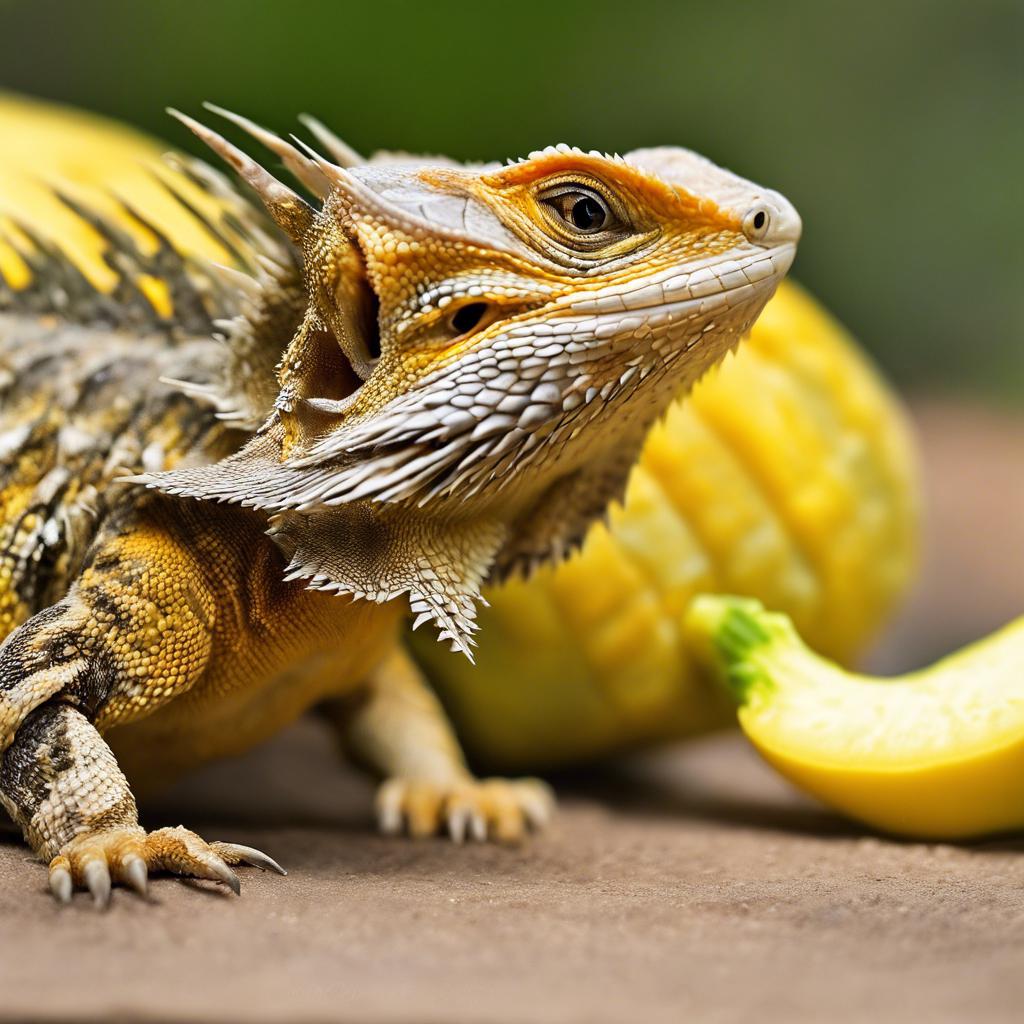Summer squash is a popular vegetable that belongs to the Cucurbitaceae family. It is known for its vibrant colors, mild flavor, and tender texture. Summer squash varieties include zucchini, yellow squash, and pattypan squash. These vegetables are widely consumed by humans due to their versatility in cooking and their nutritional benefits.
In recent years, there has been a growing trend of feeding bearded dragons with fresh vegetables as part of their diet. Bearded dragons are omnivorous reptiles that require a balanced diet consisting of both insects and plant matter. While insects provide essential protein, fresh vegetables contribute to their overall health by providing vitamins, minerals, and fiber.
This leads us to the question: can bearded dragons eat summer squash? The answer is yes, summer squash can be a safe and nutritious addition to a bearded dragon's diet. However, it is important to understand the nutritional benefits of summer squash for bearded dragons and how to properly prepare and serve it.
Key Takeaways
- Summer squash is a nutritious vegetable that can be fed to bearded dragons.
- Summer squash is high in vitamins A and C, as well as fiber and water content.
- Summer squash should be washed, peeled, and cut into small pieces before feeding to bearded dragons.
- Bearded dragons should be fed summer squash in moderation, as part of a balanced diet.
- Overfeeding summer squash can lead to health issues, such as obesity and nutritional deficiencies.
Nutritional Benefits of Summer Squash for Bearded Dragons
Summer squash is packed with essential nutrients that can benefit the health of bearded dragons. It is a good source of vitamins A, C, and K, as well as minerals such as potassium and manganese. These nutrients play a crucial role in maintaining the overall health and well-being of bearded dragons.
Vitamin A is important for maintaining healthy skin, eyesight, and immune function in bearded dragons. It also helps in the growth and development of bones and teeth. Vitamin C is an antioxidant that supports the immune system and helps in the absorption of iron. Vitamin K is essential for blood clotting and bone health.
Potassium is an electrolyte that helps maintain proper fluid balance in the body and supports muscle function. Manganese is involved in various metabolic processes and plays a role in the formation of connective tissues and bones.
Including summer squash in a bearded dragon's diet can help ensure they receive these essential nutrients, contributing to their overall health and well-being. However, it is important to note that summer squash should not be the sole source of nutrition for bearded dragons. A varied diet that includes a mix of vegetables, fruits, and insects is necessary to meet all their nutritional needs.
Preparing Summer Squash for Bearded Dragons
Before feeding summer squash to bearded dragons, it is important to properly wash and prepare it. This helps remove any dirt or pesticides that may be present on the surface of the vegetable. It is recommended to use organic summer squash whenever possible to minimize exposure to harmful chemicals.
When preparing summer squash for bearded dragons, it is important to remove any seeds or tough skin. The seeds can be a choking hazard and the tough skin can be difficult for them to digest. To remove the seeds, simply cut the squash in half lengthwise and use a spoon or knife to scoop them out. The skin can be easily removed by peeling it with a vegetable peeler or a knife.
After removing the seeds and skin, the summer squash can be cut into appropriate sizes for feeding. It is recommended to cut it into small, bite-sized pieces that are easy for bearded dragons to consume. This helps prevent choking and ensures they can properly digest the vegetable.
Serving Size and Frequency of Summer Squash for Bearded Dragons
The serving size of summer squash for bearded dragons depends on their size and age. As a general guideline, adult bearded dragons can be fed around 10-20% of their diet as vegetables, including summer squash. For younger dragons, vegetables should make up a smaller portion of their diet, around 5-10%.
It is important to note that while summer squash can be a healthy addition to their diet, it should not be the main component. Bearded dragons require a balanced diet that includes a mix of vegetables, fruits, and insects. This ensures they receive all the necessary nutrients for their growth and overall health.
The frequency at which summer squash should be fed to bearded dragons can vary. Some owners choose to offer it as a daily staple, while others prefer to feed it a few times a week. It is important to monitor their intake and adjust the frequency accordingly. If they are consuming too much summer squash and not enough other foods, it can lead to nutritional imbalances.
Summer Squash as a Treat for Bearded Dragons
Summer squash can also be used as a treat for bearded dragons. Treats are a great way to provide enrichment and variety in their diet. Fresh vegetables make excellent treats as they are low in calories and provide additional nutrients.
Using fresh vegetables as treats instead of processed foods is beneficial for bearded dragons. Processed foods often contain additives, preservatives, and excessive amounts of sugar or salt, which can be harmful to their health. Fresh vegetables, on the other hand, are natural and provide essential nutrients without any added chemicals.
There are various ways to incorporate summer squash into treat recipes for bearded dragons. One simple idea is to slice the squash into thin rounds and dehydrate them in a food dehydrator or oven at a low temperature. This creates a crunchy texture that bearded dragons enjoy. Another option is to steam or lightly cook the summer squash and mix it with other vegetables or fruits to create a colorful and nutritious treat.
Bearded Dragon Care: Providing a Balanced Diet

Providing a balanced diet is crucial for the overall health and well-being of bearded dragons. In addition to summer squash, their diet should include a variety of vegetables, fruits, and insects.
Vegetables such as kale, collard greens, mustard greens, and bell peppers are excellent choices for bearded dragons. These vegetables are rich in vitamins and minerals and provide essential fiber for their digestive health. Fruits such as berries, melons, and apples can be offered in moderation as they contain natural sugars.
Insects should also be a part of a bearded dragon's diet. Crickets, mealworms, and dubia roaches are commonly fed to bearded dragons as they provide essential protein. It is important to gut-load the insects before feeding them to the dragons. Gut-loading involves feeding the insects with nutritious foods to enhance their nutritional value.
Bearded Dragon Care: Proper Feeding Techniques
Proper feeding techniques are important to ensure that bearded dragons are eating properly and receiving the necessary nutrients. When offering food to bearded dragons, it is recommended to use feeding tongs or tweezers to mimic their natural hunting behavior. This helps stimulate their appetite and encourages them to eat.
It is important to provide fresh water at all times for bearded dragons. They should have access to a shallow dish of water that is cleaned and refilled daily. Bearded dragons may not drink water frequently, but it is important to offer it to prevent dehydration.
Observing their behavior during feeding is also crucial. Bearded dragons should show interest in food and actively hunt for it. If they consistently refuse food or show signs of lethargy, loss of appetite, or weight loss, it may indicate a health issue that needs to be addressed promptly.
Health Issues: Can Bearded Dragons Overeat Summer Squash?
While summer squash can be a healthy addition to a bearded dragon's diet, overfeeding can lead to health issues. One potential problem is obesity. Summer squash is low in calories, but if bearded dragons consume excessive amounts of it without balancing their diet with other foods, they can become overweight.
Obesity in bearded dragons can lead to a range of health problems, including fatty liver disease, joint issues, and decreased lifespan. It is important to monitor their intake and adjust their diet accordingly to prevent obesity.
Another potential issue is digestive problems. Bearded dragons have sensitive digestive systems, and consuming too much summer squash can cause diarrhea or other gastrointestinal issues. It is important to provide a balanced diet and not rely solely on summer squash as the main source of nutrition.
Health Issues: Signs of Nutritional Deficiencies in Bearded Dragons
Signs of nutritional deficiencies in bearded dragons can manifest in various ways. Lethargy, loss of appetite, weight loss, and changes in skin color or texture are common signs that something may be wrong with their diet.
If a bearded dragon is not receiving enough essential nutrients, it can lead to serious health problems. For example, a deficiency in vitamin A can cause eye problems and weakened immune function. A deficiency in calcium can lead to metabolic bone disease, which affects the strength and structure of their bones.
If any signs of nutritional deficiencies are observed, it is important to address them promptly. This may involve adjusting their diet to include more nutrient-rich foods or adding supplements as recommended by a veterinarian.
Summer Squash as a Healthy Addition to Bearded Dragon Diets
In conclusion, summer squash can be a safe and nutritious addition to a bearded dragon's diet. It is packed with essential vitamins and minerals that contribute to their overall health and well-being. However, it should not be the sole source of nutrition and should be offered in moderation as part of a balanced diet.
Providing a varied and balanced diet is crucial for the overall health of bearded dragons. This includes a mix of vegetables, fruits, and insects to ensure they receive all necessary nutrients. Proper feeding techniques and monitoring their intake are important to prevent health issues such as obesity or nutritional deficiencies.
By incorporating summer squash into their diet as a healthy addition, bearded dragons can enjoy the benefits of this nutritious vegetable. Remember to always consult with a veterinarian or reptile specialist for specific dietary recommendations for your bearded dragon.
If you're curious about what other foods are safe for your bearded dragon, you might want to check out this informative article on Reptile Wizard's website. They discuss whether bearded dragons can eat summer squash and provide valuable insights into the nutritional benefits and potential risks associated with this vegetable. To learn more, click here: Can Bearded Dragons Eat Summer Squash?
FAQs
What is summer squash?
Summer squash is a type of vegetable that belongs to the Cucurbitaceae family. It is a popular vegetable during the summer season and comes in different varieties such as zucchini, yellow squash, and pattypan squash.
Can bearded dragons eat summer squash?
Yes, bearded dragons can eat summer squash. It is a safe and nutritious vegetable that can be included in their diet.
What are the nutritional benefits of summer squash for bearded dragons?
Summer squash is a good source of vitamins A and C, potassium, and fiber. These nutrients are essential for the overall health and well-being of bearded dragons.
How should summer squash be prepared for bearded dragons?
Summer squash should be washed thoroughly and cut into small pieces before feeding it to bearded dragons. It can be served raw or cooked, but it is recommended to cook it to make it easier for bearded dragons to digest.
Can bearded dragons eat all types of summer squash?
Yes, bearded dragons can eat all types of summer squash including zucchini, yellow squash, and pattypan squash. However, it is important to feed them in moderation and to avoid feeding them any spoiled or rotten squash.

